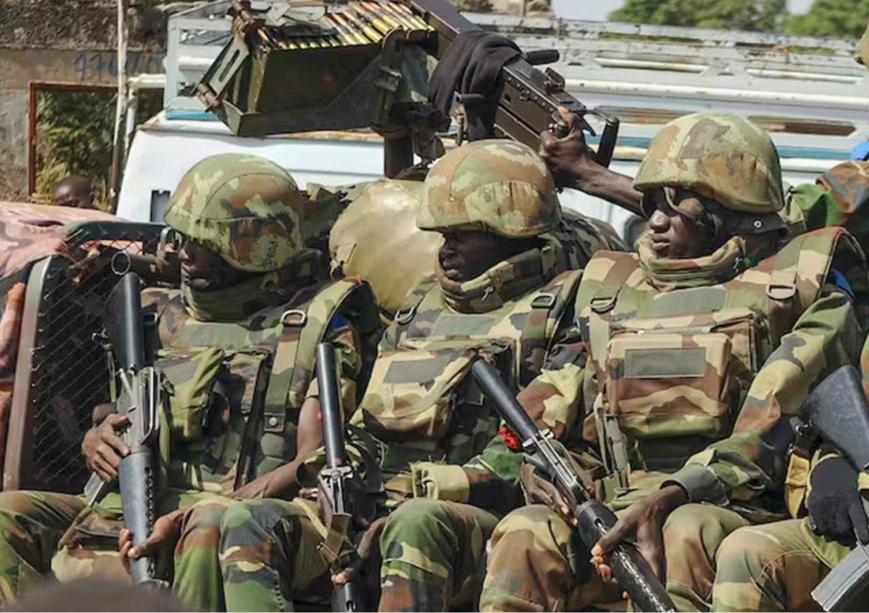
As the African continent and beyond is rejoicing its permanent membership of the G20 group, one more African nation underwent a military takeover, extending the spree of coups in West and Central Africa. On August 30, Gabon’s elected Prime Minister (PM), Ali Bongo was toppled by a junta of senior officers led by General Nguema. With this, Bongo became the eighth leader to be ousted in West and Central Africa since 2020. The coup resulted in an abrupt end to the Bongo dynasty’s 55-year regime in Gabon. Omar Bongo ruled the country for nearly 42 years since 1967. At the time of his death in 2009, his son, Ali Bongo, who served under his father as defence minister, won the presidency. The Opposition criticised the disputed election as a dynastic handover, and riots shook the country’s economic capital, Port-Gentil. Again, when he won the second term in 2016, violent protests broke out in the country’s capital, Libreville.
[pullquote]The Opposition criticised the disputed election as a dynastic handover, and riots shook the country’s economic capital, Port-Gentil.[/pullquote]
A close French ally like his father, Bongo had been seeking his third term in office and won the recently held election with 64 per cent. The Opposition candidate Albert Ondo Ossa, despite stitching an alliance of six Opposition parties under the coalition “Alternance 2023”, could garner only 30.77 per cent of the vote. Ironically, the ousting took place minutes after the Gabonese Election Centre (CGE) announced Bongo’s win in the presidential elections, irrespective of the fraud allegations from the Opposition parties.
The unfolding of the coup
On the morning of August 30, shortly after the election results were made public, a dozen soldiers identified as members of “The Committee of Transition and the Restoration of Institutions (CTRI)” appeared on national television to declare the election invalid and dissolved all state institutions. Following this declaration, tens of thousands of people came out to celebrate in the streets of Libreville, the country’s capital. Similar joyous crowds could also be seen in the roads and commercial centre of Port-Gentil. As a matter of fact, earlier in January 2019, there was a coup attempt by a group of army officers when Bongo was undergoing treatment in Morocco due to a stroke. That failed coup undoubtedly indicated Bongo’s waning control over the country’s military. As ‘the President is safe’, a classic coup catch-phrase goes, according to the military, the ousted PM is being held under house arrest and can travel abroad for medical treatment. Yet, the President issued an emotional appeal to the friends of Gabon across the world to “make noise” in support of him and his family. Additionally, the coup leaders arrested Noureddin Bongo Valentin, the ousted President’s son, and six others on high treason charges.
[pullquote]The President issued an emotional appeal to the friends of Gabon across the world to “make noise” in support of him and his family.[/pullquote]
On September 4, Gabon’s new military leader, General Nguema, took the oath as interim President. During his oath-taking ceremony in the presidential palace in Libreville, Gabon’s capital, the leader promised “free, transparent and credible elections” to restore civilian rule with new electoral legislation, a new penal code, and a referendum on a new Constitution. Additionally, he promised to free all the political prisoners and stated that the coup had actually helped to prevent any bloodshed after the elections.
International reaction
The African Union denounced it and consequently suspended Gabon’s membership. The international community, including the United Nations and France, criticised the takeover and pressured the junta to spell out plans for restoring civilian rule. The Economic Community of Central African States (ECCAS) also condemned the coup and called for dialogue to restore the civilian regime. So far, no country has acknowledged Nguema as Gabon’s legitimate leader.
[pullquote]The Economic Community of Central African States (ECCAS) also condemned the coup and called for dialogue to restore the civilian regime.[/pullquote]
The coup puts France, Gabon’s former colonial ruler, in the most precarious situation. As France has always endorsed Ali Bongo and shared a cordial relationship, France might actually consider a military intervention in order to restore the democratically-elected government of Gabon. Around 400 French soldiers are permanently stationed in the country for training and military assistance, including at a base in the capital. France also has extensive economic ties with Gabon. At least 80 French companies, particularly in the mining and oil industries, are registered in Gabon. Gabon is the world’s second-biggest manganese producer after South Africa, and France extracts 90 per cent of Gabon’s manganese. The French Prime Minister, Elisabeth Borne, stated that France was closely monitoring the situation.
Coup d’état or palace revolution ?
Just the day after staging a coup, Nguema met the French ambassador to Gabon, Alexis Lamek, and pledged to improve ties with Paris. In less than a week, Nguema inaugurated himself as Gabon’s transitional President, established a new parliament, and freed political prisoners. The speedy swearing-in was probably an attempt to prove his legitimacy and consolidate his power to dissuade potential opponents from challenging his leadership. It can also mean that the old establishment is still in charge.
[pullquote]The 48-year-old general served as a bodyguard to Ali Bongo’s late father and headed the Republican Guard, an elite military unit.[/pullquote]
Undoubtedly, with this change of guard, Gabonese citizens who were desperately seeking change see a ray of hope. Ironically, the coup leader, General Nguema, is a cousin of the ousted President. The 48-year-old general served as a bodyguard to Ali Bongo’s late father and headed the Republican Guard, an elite military unit. He has been part of Bongo’s close group of loyalists. This is one reason why the Opposition candidate Ossa labelled the coup as a “palace revolution”, which was merely a tactic used by the Bongo family to retain their absolute power over the country. Moreover, there are rumours that the coup was orchestrated by the sister of the deposed President, Pascaline Bongo. Indeed, many people think that Gen Nguema’s rule will not be any different from the 55-year Bongo dynasty, best described as a family affair where one brother replaces another.
The aftermath of the coup in Gabon
Gabon, ranked 35th in oil reserves, is an OPEC member. It is one of the wealthiest countries in Africa in terms of per-capita income. Yet, over a third of its 2.4 million people live in poverty, and 40 percent of those between 15 and 24 years old are unemployed, according to a World Bank survey of 2020. Under Bongo, Gabon fared pretty appalling in the Freedom House Index, scoring just 20 out of 100. This was primarily due to President Bongo’s control over the country’s military. Ironically, today, the future of Bongo is uncertain; so is his control of the same army. Although the junta promised a free and fair election, they did not set a timeline for it. Later, General Nguema recruited an economist, Mr. Raymond Ndong Sima, as the “prime minister of the transition”. Mr. Sima promised to hold an election within two years.
[pullquote]The political demise of Bongo reflects a particular pattern of coups in Francophone Africa.[/pullquote]
With this coup, Gabon joins the unfamous group of countries such as Mali, Guinea, Burkina Faso and Niger. All of these African countries have undergone coups in the last three years. The political demise of Bongo reflects a particular pattern of coups in Francophone Africa. Conversely, Russia has been working hard to expand its influence in the region and may take this as an opportunity to do so by backing Gabon’s junta government.
Conclusion
The region, infamously known as the coup belt, even a decade earlier, was gradually shedding its bad reputation. However, persistent insecurity and corruption have resulted in a trend that is causing alarm in Africa and beyond. Fighting Islamist insurgencies that undermined trust in democratic governments is a priority for Niger and other Sahel countries. Although Gabon is located further south along the Atlantic coast, it does not have these difficulties. A coup would be yet another strong signal of democratic regress in a vulnerable area. The numerous other established leaders in the area, whose democratic mandates may be weaker than their reliance on their armed forces or foreign mercenaries to keep them in power, will be closely watching the events following the coup in Gabon. The coup in Gabon also highlights a fundamental cause of coups throughout Africa: The demise of electoral processes and the rising popularity of military authority. Meanwhile, for the people of Gabon, it is the first step towards democracy, and they will keep hoping for a free and fair election in which the old guard relinquishes control.
Samir Bhattacharya is Senior Research Associate at Vivekananda International Foundation.
The views expressed above belong to the author(s). ORF research and analyses now available on Telegram! Click here to access our curated content — blogs, longforms and interviews.




 PREV
PREV


